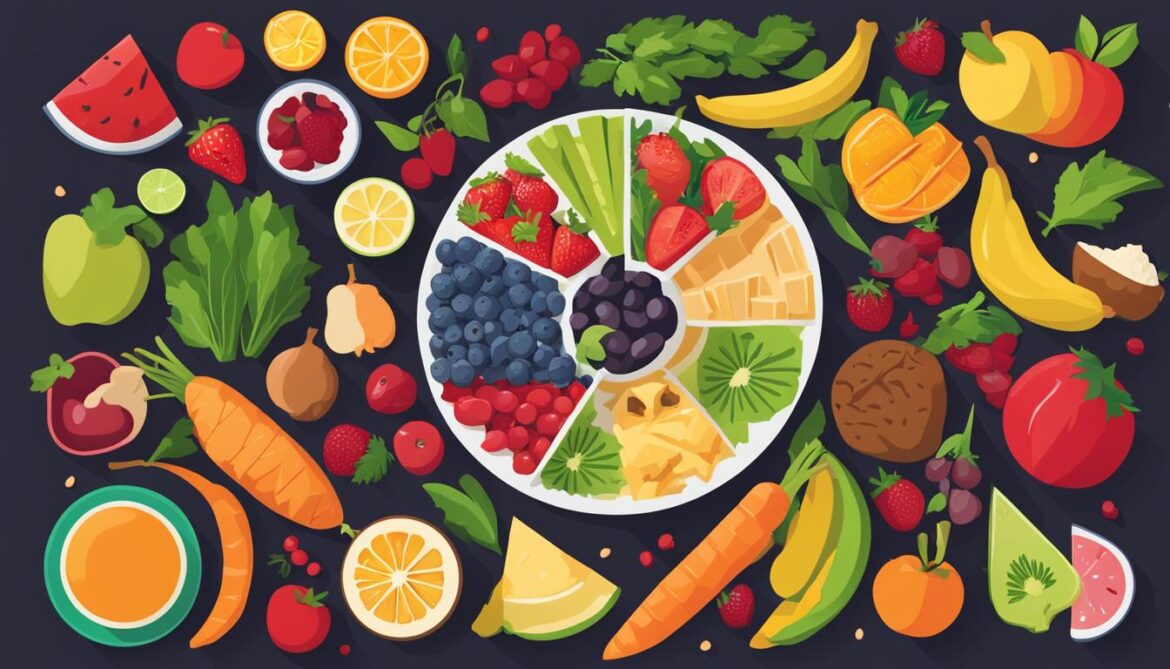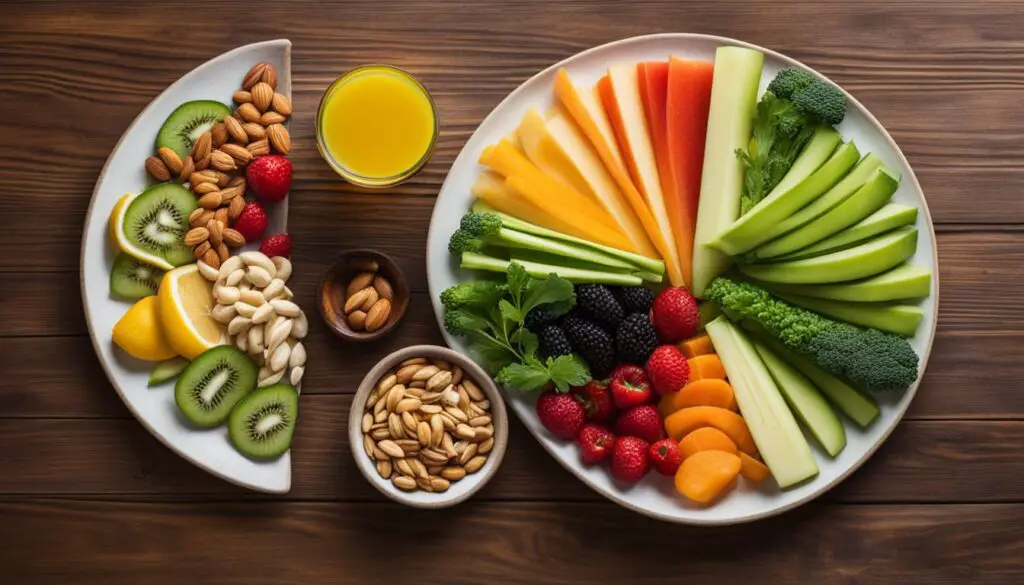I’m excited to share with you the importance of meal planning for post-pregnancy weight loss. As a new mother myself, I understand the challenges that come with wanting to lose weight while juggling the responsibilities of caring for a newborn. Meal planning has been a game-changer for me, helping me nourish my body, shed the extra pounds, and establish healthy eating habits.
Meal planning involves carefully selecting and preparing meals that are nutritious, balanced, and supportive of your weight loss goals. It’s not about depriving yourself or following restrictive diets but rather about making informed choices and creating a sustainable eating plan.
Key Takeaways:
- Meal planning is essential for post-pregnancy weight loss and overall well-being.
- A well-balanced meal plan should include lean protein, whole grains, fruits, vegetables, and healthy fats.
- Designing a meal plan that considers individual needs, preferences, and goals is crucial.
- Successful meal planning involves preparing meals in advance, incorporating variety, and controlling portion sizes.
- Consulting with a registered dietitian or nutritionist can help create a personalized meal plan.
The Importance of Nutritious Meals for Post-Pregnancy Weight Loss
Nutritious meals are crucial for successful post-pregnancy weight loss. As a new mother, you need an adequate supply of essential nutrients to support your recovery, breastfeeding efforts, and overall well-being. A well-balanced meal plan that includes a variety of nutrient-rich foods is key to achieving your weight loss goals while maintaining optimal nutrition.
When planning your meals, aim to incorporate the following food groups:
- Lean Protein: Lean protein sources like chicken, turkey, fish, tofu, legumes, and low-fat dairy products provide essential amino acids for muscle repair and growth.
- Whole Grains: Opt for whole grains like quinoa, brown rice, oats, and whole wheat bread to provide long-lasting energy, fiber, and important vitamins and minerals.
- Fruits and Vegetables: Include a variety of colorful fruits and vegetables in your meals to supply antioxidants, vitamins, minerals, and fiber. These help promote satiety, aid digestion, and support overall health.
- Healthy Fats: Incorporate sources of healthy fats such as avocados, nuts, seeds, and olive oil. These provide essential fatty acids, promote satiety, and support brain function.
By including these nutrient-dense foods in your meals, you can achieve greater satiety, support muscle growth, and maintain stable blood sugar levels. These factors are crucial for sustainable weight loss and overall well-being.
Remember, it’s important to consult with a healthcare professional or registered dietitian before making any significant dietary changes, especially if you’re breastfeeding. They can provide personalized guidance and ensure your dietary plan aligns with your individual needs.
Designing a Meal Plan for Post-Pregnancy Weight Loss
Designing an effective meal plan for post-pregnancy weight loss requires careful consideration of individual needs, preferences, and goals. It is crucial to create a calorie deficit to promote weight loss, while also ensuring adequate nutrient intake and supporting breastfeeding. A well-designed meal plan should include regular, small meals and snacks throughout the day to maintain energy levels and prevent overeating.
Focusing on Variety and Portion Control
When designing a meal plan, it is essential to incorporate a variety of nutritious foods to ensure optimal nutrient intake. Including a mix of lean proteins, whole grains, fruits, vegetables, and healthy fats can provide the necessary nutrients for post-pregnancy recovery and weight loss. Additionally, practicing portion control helps manage calorie intake and prevents overeating.
| Meal | Food Group | Serving Size |
|---|---|---|
| Breakfast | Whole grain cereal with berries and low-fat milk | 1 cup |
| Snack | Greek yogurt with mixed nuts | 1 serving |
| Lunch | Grilled chicken salad with mixed greens and vinaigrette dressing | 2 cups |
| Snack | Carrot sticks with hummus | 1 serving |
| Dinner | Baked salmon with quinoa and steamed vegetables | 3-4 ounces |
| Evening Snack | Apple slices with almond butter | 1 serving |
Mindful Eating for Successful Weight Loss
Incorporating mindful eating practices into a post-pregnancy meal plan can enhance weight loss efforts. Paying attention to hunger and fullness cues, savoring each bite, and eating slowly can help prevent overeating and promote a healthier relationship with food. Additionally, practicing mindful eating can increase awareness of portion sizes and promote a greater sense of satisfaction from meals.
Remember, designing a meal plan for post-pregnancy weight loss should focus on creating a calorie deficit while ensuring adequate nutrient intake and supporting breastfeeding. Incorporating a variety of nutritious foods, practicing portion control, and embracing mindful eating can contribute to successful weight loss and long-term healthy habits.
Designing a meal plan for post-pregnancy weight loss requires careful consideration of individual needs, preferences, and goals. It is crucial to create a calorie deficit to promote weight loss, while also ensuring adequate nutrient intake and supporting breastfeeding. A well-designed meal plan should include regular, small meals and snacks throughout the day to maintain energy levels and prevent overeating.
Tips for Successful Meal Planning
Successful meal planning is a key factor in achieving post-pregnancy weight loss goals. By following these tips, you can create a well-rounded and nourishing meal plan that supports your weight loss journey:
- Prepare meals in advance: By prepping your meals ahead of time, you can save valuable time and ensure that you have healthy options readily available. Portion out your meals into individual containers for easy access and portion control.
- Incorporate a variety of fruits and vegetables: Include a wide range of colorful fruits and vegetables in your meal plan to maximize nutrient intake. These foods are rich in vitamins, minerals, and fiber, which can support weight loss and overall health.
- Choose lean protein sources: Opt for lean protein options such as poultry, fish, and plant-based sources like beans and lentils. Protein helps to keep you feeling full and satisfied, while also supporting muscle growth and repair.
- Avoid processed foods and added sugars: Limit your intake of processed foods, as they tend to be high in calories, unhealthy fats, and added sugars. Instead, focus on whole, unprocessed foods that provide essential nutrients without unnecessary additives.
- Stay hydrated: Drinking plenty of water throughout the day is crucial for overall health and weight loss. Water helps to boost metabolism, reduce appetite, and keep you energized. Aim to drink at least 8 glasses of water daily.
- Consult a registered dietitian or nutritionist: Seeking guidance from a professional can be invaluable in creating a personalized meal plan that meets your specific needs and preferences. They can provide expert advice, monitor your progress, and make necessary adjustments along the way.
Following these tips will help you establish a successful meal planning routine that promotes post-pregnancy weight loss while ensuring you receive optimal nutrition. Remember to consult with a healthcare professional before making any significant changes to your diet or exercise routine.
Note: The image above illustrates the importance of successful meal planning for post-pregnancy weight loss.
Conclusion
In conclusion, meal planning plays a crucial role in post-pregnancy weight loss. By focusing on making healthier food choices, controlling portion sizes, and creating a calorie deficit, new mothers can successfully achieve their weight loss goals. Incorporating nutritious meals into carefully designed meal plans can support sustainable weight loss while ensuring optimal nutrition and overall well-being.
Meal planning helps new mothers establish healthy eating habits and encourages mindful eating. It allows for a variety of nutritious foods, including lean protein, whole grains, fruits, vegetables, and healthy fats. By following a well-balanced meal plan, new mothers can increase satiety, promote muscle growth, and maintain stable blood sugar levels, all of which contribute to successful post-pregnancy weight loss.
However, it is important to consult with a healthcare professional before starting any weight loss journey post-pregnancy. They can provide tailored advice, address individual needs or concerns, and ensure that the meal plan aligns with the mother’s specific circumstances. With the right guidance and consistent monitoring, new mothers can navigate their post-pregnancy weight loss journey with confidence and achieve long-lasting results.
FAQ
How important is meal planning for post-pregnancy weight loss?
Meal planning is an essential component of a successful post-pregnancy weight loss journey. It involves carefully selecting and preparing meals that are nutritious, balanced, and supportive of weight loss goals.
What should a well-balanced meal plan for post-pregnancy weight loss include?
A well-balanced meal plan for post-pregnancy weight loss should include lean protein, whole grains, fruits, vegetables, and healthy fats. This combination of nutrients helps to increase satiety, support muscle growth, and maintain stable blood sugar levels.
How can I design an effective meal plan for post-pregnancy weight loss?
Designing an effective meal plan for post-pregnancy weight loss involves considering individual needs, preferences, and goals. It is essential to create a calorie deficit to promote weight loss, but without compromising nutrient intake or breastfeeding. The meal plan should include regular, small meals and snacks to support energy levels throughout the day. Incorporating variety, portion control, and mindful eating can also contribute to successful weight loss.
What are some tips for successful meal planning?
Some tips for successful meal planning for post-pregnancy weight loss include: preparing meals in advance and portioning them out for easy access and control, including a variety of fruits and vegetables for added nutrients and fiber, opting for lean protein sources such as poultry, fish, and plant-based options, limiting processed foods, added sugars, and high-calorie snacks, staying hydrated by drinking plenty of water throughout the day, and seeking guidance from a registered dietitian or nutritionist to create a personalized meal plan.
Is meal planning necessary for post-pregnancy weight loss?
Yes, meal planning is a necessary tool for post-pregnancy weight loss. It helps new mothers make healthier food choices, control portion sizes, and create a calorie deficit to support weight loss goals. By incorporating nutritious meals, carefully designed meal plans, and consistent monitoring, new mothers can achieve sustainable weight loss while maintaining optimal nutrition and overall well-being.
Source Links
- https://ca.finance.yahoo.com/news/taylor-swift-brittany-mahomes-super-115404702.html
- https://www.diabetes.co.uk/news/2024/jan/weight-loss-drugs-may-also-reduce-cravings-for-alcohol.html
- https://news-max-247.com/rapid-weight-loss-during-late-pregnancy/



